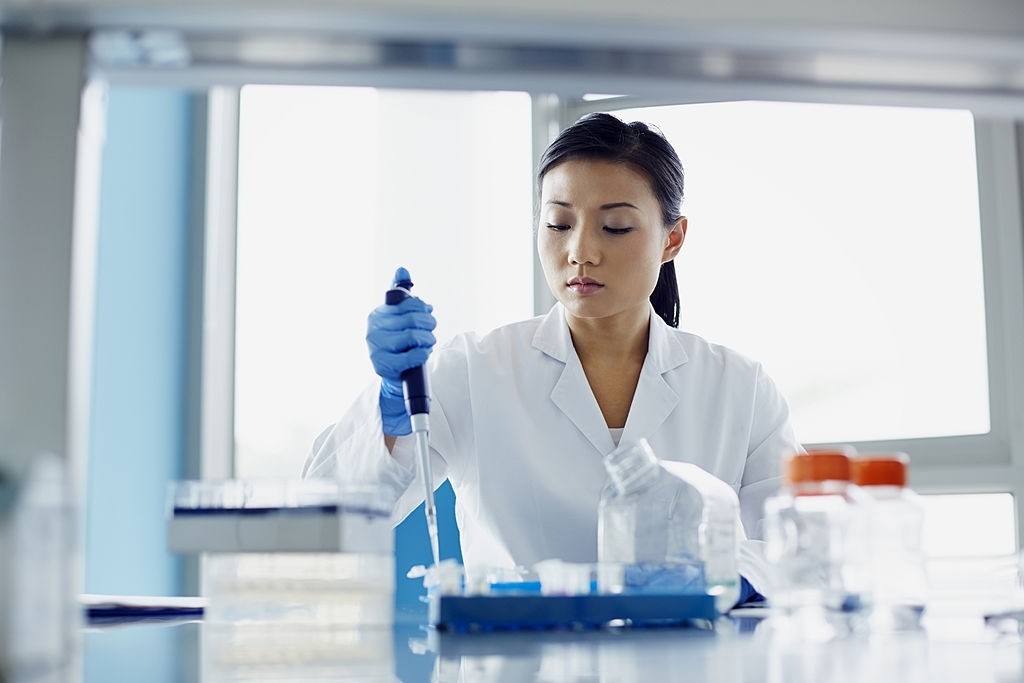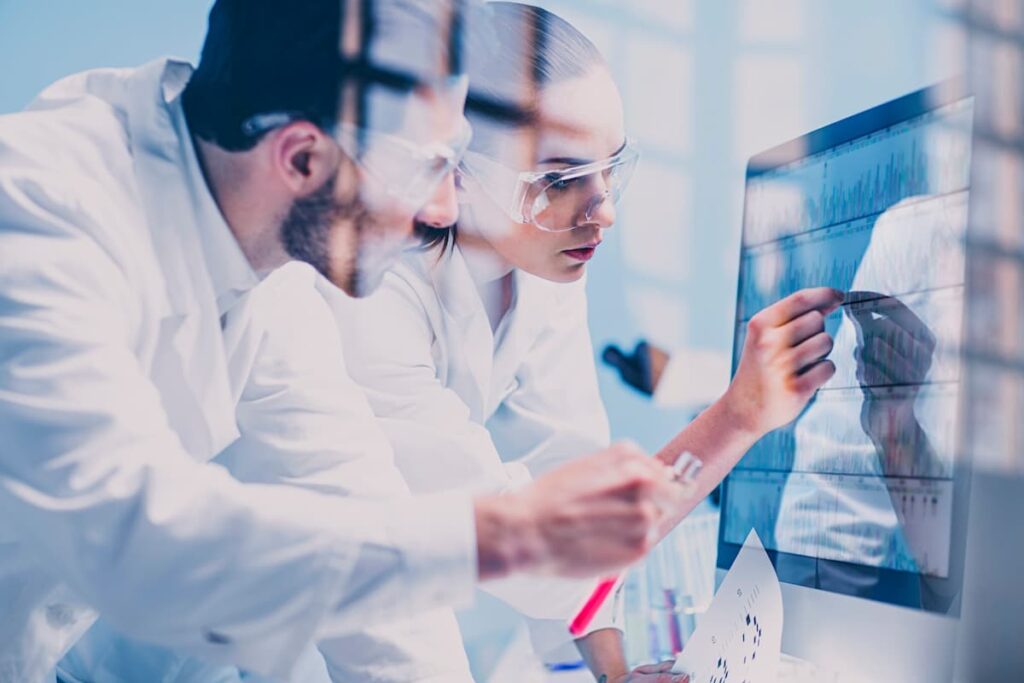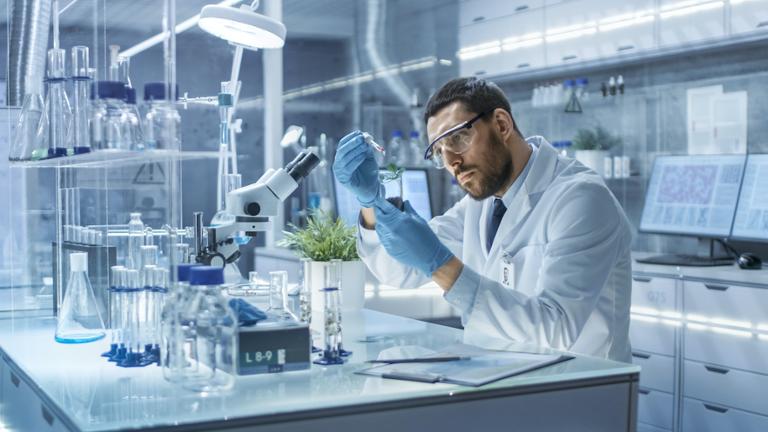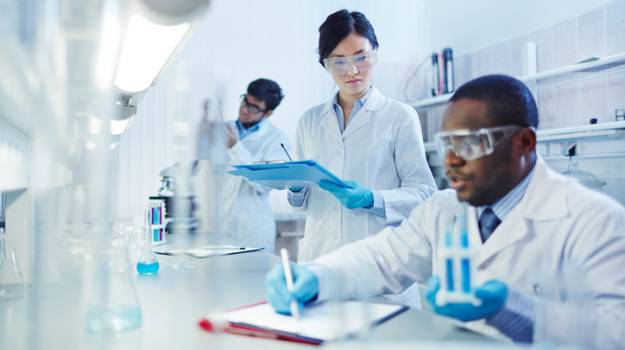A biotechnologist applies biological principles and techniques to develop products and technologies that improve our lives and the environment. Their job involves various tasks such as researching and manipulating biological systems, developing new pharmaceuticals, improving agricultural processes, creating biofuels, and advancing medical diagnostics and treatments.
They work in diverse fields including pharmaceuticals, agriculture, environmental science, and healthcare, often collaborating with other scientists, engineers, and professionals to innovate and solve complex problems.
How do biotechnologists contribute to various industries?

Biotechnologists play a crucial role in various industries through their expertise in manipulating biological systems for practical applications. Here’s how they contribute across different sectors:
Pharmaceuticals and Medicine
Biotechnologists use techniques like genetic engineering and high-throughput screening to identify potential drug candidates. For example, they might engineer bacteria to produce specific proteins for drug targets.
Biotechnologists play a crucial role in developing vaccines against infectious diseases. Modern vaccine technologies, such as mRNA vaccines, rely heavily on biotechnological approaches.
Biotechnologists contribute to the development of personalized medicine by analyzing genetic information to tailor treatments to individual patients, improving efficacy and reducing side effects.
Agriculture
Biotechnologists develop genetically modified crops with traits like herbicide resistance, pest resistance, and improved nutritional content. For instance, they might engineer corn to produce its pesticide, reducing the need for external chemical inputs.
Biotechnologists leverage technologies like CRISPR to precisely edit plant genomes, enabling the development of crops suited to specific environmental conditions and agricultural practices.
Environmental Conservation
Biotechnologists engineer microorganisms capable of degrading pollutants like oil spills and industrial waste, offering sustainable solutions for environmental cleanup.
Biotechnologists work on optimizing the production of biofuels from renewable sources such as algae, plant biomass, and waste materials, reducing dependence on fossil fuels and mitigating climate change.
Food Industry
Biotechnologists develop genetically modified organisms (GMOs) to enhance crop yield, nutritional value, and shelf life. They might engineer rice to produce higher levels of essential nutrients like vitamin A, addressing malnutrition in developing countries.
Biotechnologists develop rapid and sensitive detection methods for foodborne pathogens, ensuring the safety of food products throughout the supply chain.
Industrial Biotechnology
Biotechnologists engineer enzymes for use in industrial processes such as detergent manufacturing, textile processing, and paper production, improving efficiency and reducing environmental impact.
Biotechnologists develop microbial platforms for producing chemicals, plastics, and bio-based materials from renewable feedstocks, contributing to the shift towards a bio-based economy.
Biomedical Research
Biotechnologists develop gene therapies to treat genetic disorders by delivering functional genes or editing faulty ones. For example, they might use viral vectors to deliver therapeutic genes to target cells.
Biotechnologists explore stem cell technologies for tissue engineering and organ regeneration, offering potential treatments for injuries and degenerative diseases.
Bioinformatics
Biotechnologists use bioinformatics tools to analyze large-scale genomic data, identifying genetic variations associated with diseases and drug responses.
Biotechnologists employ computational modeling and virtual screening techniques to identify drug candidates with the desired properties, accelerating the drug discovery process.
What are the applications of biotechnology in different sectors?

Biotechnology has a wide range of applications across various sectors, harnessing the power of biological systems to solve complex problems and improve processes. Here are some key applications of biotechnology in different sectors:
Healthcare and Medicine
Biotechnology plays a crucial role in identifying, designing, and producing new drugs, including biologics like monoclonal antibodies and recombinant proteins.
Biotechnological techniques enable the development of rapid and sensitive diagnostic tests for diseases ranging from infectious pathogens to genetic disorders.
Biotechnology offers promising approaches for treating genetic diseases by delivering therapeutic genes to target cells.
Biotechnological methods are used to develop vaccines against infectious diseases, including mRNA vaccines like those used in COVID-19 immunization campaigns.
Agriculture
Biotechnology is used to genetically modify crops for traits such as pest resistance, drought tolerance, and improved nutritional content.
Biotechnological tools, including remote sensing and genomic analysis, help optimize agricultural practices by providing precise information about soil, weather, and crop health.
Biotechnology contributes to sustainable farming practices by developing bio-based pesticides, fertilizers, and plant growth regulators.
Environmental Conservation
Biotechnological approaches are employed to clean up environmental pollutants by using microorganisms to degrade contaminants in soil, water, and air.
Biotechnology enables the production of biofuels from renewable sources such as algae, plant biomass, and waste materials, offering alternatives to fossil fuels and reducing greenhouse gas emissions.
Food and Beverage Industry
Biotechnological methods are used to develop genetically modified organisms (GMOs) with improved traits such as higher yield, enhanced nutritional content, and resistance to pests and diseases.
Biotechnology contributes to food safety by developing rapid and sensitive detection methods for foodborne pathogens and contaminants.
Biotechnological enzymes and microbial cultures are utilized in food processing to improve flavor, texture, and shelf life.
Industrial Biotechnology
Biotechnologists engineer enzymes for use in industrial processes such as detergent manufacturing, textile processing, and biofuel production.
Biotechnology enables the production of bio-based materials, including bioplastics, biofuels, and biomaterials for use in packaging, construction, and textiles.
Bioinformatics
Biotechnologists use bioinformatics tools to analyze large-scale genomic data for applications such as personalized medicine, evolutionary biology, and genetic engineering.
Biotechnology contributes to drug discovery by employing computational modeling, virtual screening, and machine learning techniques to identify potential drug candidates and predict their interactions with biological targets.
How can one become a biotechnologist?
Becoming a biotechnologist typically involves acquiring a combination of education, skills, and practical experience in biology, chemistry, and related fields. The journey usually begins with obtaining a Bachelor’s Degree in a relevant field such as biology, biochemistry, molecular biology, microbiology, or biotechnology, providing a solid foundation in biological sciences. During undergraduate studies, individuals may have the opportunity to specialize in biotechnology through elective courses, research projects, or internships. Gaining laboratory experience is crucial, and aspiring biotechnologists should seek internships, research assistant positions, or volunteer opportunities in academic or industry laboratories to develop practical skills and understanding of biotechnological techniques. Participation in undergraduate research projects under faculty mentors is also invaluable for applying classroom knowledge to real-world scientific inquiry.
Continuing education is essential for advancing in the field, with options including pursuing advanced degrees such as Master’s or Ph.D. degrees in biotechnology or related disciplines. These advanced degrees offer in-depth knowledge, research experience, and specialized training in biotechnological techniques. Depending on career goals, individuals may choose to specialize further in areas such as genetic engineering, drug development, bioinformatics, or industrial biotechnology. Developing key skills is fundamental, including proficiency in laboratory techniques, analytical and problem-solving skills, and effective written and oral communication skills. Staying updated on the latest advancements and trends in biotechnology through continuous learning, reading scientific literature, and attending conferences is essential for professional growth.
Gaining professional experience is crucial for entry into the biotechnology field, and individuals should seek internships, cooperative education programs, or entry-level positions such as research assistant or laboratory technician to gain industry-specific experience and further develop their skills. Depending on the area of specialization and geographic location, individuals may need to obtain certifications or licensure to practice certain aspects of biotechnology, such as laboratory safety or clinical testing. By following these steps and actively pursuing opportunities for education, training, and professional development, individuals can embark on a rewarding career path as biotechnologists.
What are the emerging trends and challenges in biotechnology?

In the exciting world of biotechnology, scientists are doing amazing things to help people and the planet. One cool thing they’re doing is using a tool called CRISPR to edit genes, like fixing mistakes in a computer program. But they need to be careful and think about what’s right when editing genes in people. Another neat idea is synthetic biology, where scientists create new things from scratch, like making tiny machines out of cells!
But they have to make sure these new creations are safe and won’t cause problems. Scientists are also learning more about our genes to make personalized medicine, which means treatments that are just right for each person. But they have to make sure everyone can get these treatments, not just some people. In medicine, there are also big, special drugs called biologics that can treat diseases. But it’s tricky to make enough of these drugs for everyone who needs them.
Another big job for biotechnologists is sorting through lots of information about living things, like how computers sort through lots of pictures or messages. But they have to be careful with this information and keep it safe. Biotechnology is also helping to clean up the environment by finding new ways to get rid of waste and make energy. But it’s hard to make these new ways work for everyone and not cost too much. And when there’s a big sickness going around, biotechnologists work fast to make vaccines and medicines to help people get better.
But they need to make sure these vaccines and medicines are safe and reach everyone who needs them. Overall, biotechnology is super exciting, but scientists have to think about what’s safe and fair when they’re making new things and helping people.
Final Words
Biotechnologists play a crucial role in improving our lives and the world around us. They work in diverse fields like healthcare, agriculture, and environmental science, using biological principles to develop new products and technologies. Through research and collaboration, they tackle challenges and drive innovation. As we move forward, the importance of biotechnology will only grow, offering opportunities for advancements that benefit society. It’s essential to continue supporting research and education in this field to unlock its full potential and address future challenges effectively.
